- Home
- Jeff Gunhus
Resurrection America Page 10
Resurrection America Read online
Page 10
The armored assault vehicle looked like something out of a science fiction movie. Heavy armor-plating was set at odd angles to distort radar imagery. Short antennas stuck out all over the body. These were the sensors for the AAV’s camo capabilities. By evaluating the scene behind it, the machine could change the thin outer layer to mimic it perfectly, effectively hiding the AAV from sight, even when it was on the move.
But whoever was driving it now didn’t want the stealth. They wanted the full, awesome impact the machine delivered as it rumbled down the street.
As if seeing an AAV in his hometown wasn’t enough, the sight of the support walking next to and around the machine sent chills down Rick’s spine.
They were dressed in bright yellow hazmat suits, not the light-weight stuff the military gave the Marines when there was a bio/chem threat, but the heavy-duty gear the military gave out when the personnel entered an area where bio/chem was confirmed present.
AAVs and men in hazmat suits appeared at each of the four roads entering the square. Rick spotted movement on the rooflines to his left and right and saw flashes of yellow at regular intervals taking position.
Both the men on the roof and the support teams around the AAVs all had one thing in common.
They were heavily armed and their guns were pointed at the crowd.
19
The AAVs rolled to a stop at the mouth of each of the streets, and men in hazmat suits formed a human chain on each side, cutting the roads off completely. The helo made another pass overhead.
“Move to the center of the square and remain calm. The containment teams are here for your protection only. Please move to the center of the square and remain calm.”
The arrival of so much firepower did have a calming effect on the crowds. One or two armed men constituted a terrorist attack. A hundred men with armed transports and a helicopter was the government. Their government. And while there were certainly people in the crowd who didn’t trust the government, they preferred it over a nest of Jihadis any day of the week.
The pushing slowed and then stopped, the mood in the square shifting from panic to fear and apprehension. The helo angled forward and sped out of town, at least taking the constant thump of the rotors and the wind from the downdraft out of the equation.
The square was remarkably quiet with the helo gone. People milled around, almost as if a collective shame was setting in for the initial response. People that had been knocked down during the melee were helped up and dusted off. A few of the locals took positions in front of the tipped over barbeques and directed traffic around the area.
Rick noticed more and more people holding their cell phones up, trying to get a signal. He pulled out his own phone, on impulse really, hoping like everyone else that he could use it to get some answers.
No service.
“You heard them, folks. Move slowly back into the square.” It was Bertie, using her best calming voice. Rick recalled the same tone when he was a little kid and Bertie walked through the gymnasium during a tornado warning. At that moment, she hadn’t been their principal, but their mom, soothing, calming. And she was doing it again now.
“It’s going to be all right,” she said. “Excitement’s over. Just come back into the square and we’ll get things sorted out, all right?”
To Rick’s amazement, the crowd moved to the sound of her voice, the stampede reduced to a shuffling walk back to the square where people filled in shoulder to shoulder, facing the woman on the stage with the calm voice.
Bertie turned the mic off and leaned over to Rick. “What in the sweet hell is going on?”
Before Rick could answer, an engine roared from the street to the left of the stage. The AAV moved to one side and a smaller command Humvee drove past. It hopped the curb and drove onto the grass, slowly enough to give people a chance to move out of the way. A group of six armed men in hazmat suits followed close behind it in what Rick recognized as a classic protection stance. He noticed the faceplates were not uniform but a combination of mirrored reflective glass and clear. By the time the vehicle came to a stop in front of the stage, all eyes in the square were on it.
Both doors swung open. The driver was in the same bright yellow suit as the rest of the soldiers, but the figure that stepped out from the passenger side had a dark blue hazmat suit on. The protective detail fell in around the figure in blue, guns at the ready. The entire group went to the stairs, but only the person in blue climbed onto the stage, his head down as he walked in the heavy gear.
As he got closer, Rick saw that the suit had external air tanks. The most advanced suit he’d ever worn as a Marine going into a hot zone had been equipped only with air scrubbers, not independent air systems like the ones deployed here. The helmets had bubbled faceplates like astronauts wore, wrapping around for a two-hundred-seventy-degree view. This man walking up the stairs had a clear glass version instead of the mirrored reflective type, so when he reached the stage and looked up, Rick had a perfect view of the man’s face.
Keefer.
“Sheriff,” he said, his voice coming out of the speakers on the suit.
“What’s going on here?” Rick asked.
“I’m sorry,” Keefer said, the strain in his voice evident. “There’s been an accident.” Keefer raised a gloved hand toward Bertie, indicating that he wanted the microphone. “I think it best if I explain to everyone at once.”
The quiver in the man’s voice could be heard even through the speaker. Gone was the cockiness Rick had seen up at the mine. That wasn’t good.
Bertie handed him the microphone and he held it clumsily in the gloved hand. He turned and looked Rick right in the eye. “I’m going to need your support and help over the next few hours. Can I count on it?”
Rick nodded. He didn’t know what was going on, but whatever it was, this was no drill. And it sure as hell wasn’t about an automatic mining operation coming into town.
“What’s going on?” called out someone from the crowd.
“Yeah, what’s with all the guns?” came another cry.
In seconds, the voices swelled, demanding answers. The protection detail on the base of the stage raised their guns.
“My name is––”
The PA system squelched with powerful, screeching feedback and Keefer held it away from his mask. The feedback went on for another second or two, causing a couple of thousand people to cover their ears. As soon as it dissipated, Keefer slowly raised the microphone to his suit until the barest trace of feedback started again.
“Sorry,” he said. “My name is Colonel Henry R. Keefer, United States Army, Special Weapons Division.”
A murmur passed through the crowd.
“Obviously, based on the assets you can see on display in this square and the announcement from the helo, we’re here today under very serious circumstances.” He paused, stretching out the tension. The square was dead silent. “What I’m about to tell you will cause many of you great concern. It could lead to panic like what we just saw when we arrived, but I need you all to remain calm so that no one else gets injured. Let me be clear. I’m here to tell you about a terrible problem, but I come with a solution.”
“Just tell us what happened,” a man in the crowd yelled, but this time dozens of people hushed him quiet. Keefer held them in his sway.
“The solution I bring is a complete one. With it, comes the guarantee that every single man, woman and child in this square goes home tomorrow, safe and sound.”
The murmurs started again. Rick heard the word tomorrow over and over. Finally, a young woman in the first few rows from the stage spoke up. “The helicopter said quarantine. Why would they say that?”
Voices slowly rose in agreement, the agitation increasing. Keefer held up his hand and the crowd silenced again.
“I’m going to be completely honest with you,” he said. “As Americans, you deserve it. The first piece of honesty is to admit to you that I have orders not to tell you the entire truth. My orders are only
to tell you the bare minimum. I’ve followed orders all my life, but today I’m choosing to break them and tell you everything.” He pointed up the mountain. “The federal government recently took over Resurrection Mine to conduct a secret weapons testing program and create a new generation of biological agents.”
Rick clenched his hands at his side. The high-security perimeter made sense now, but he felt the fool for being so easily played by Keefer earlier. But the worst of it was that he, like every adult in the audience, felt a shuddering terror at the mention of biological warfare. The most basic public fear since the Jihadi attacks started was another nuclear device in a major metro area like the one in DC. But the people who really followed the news analysis, and who paid attention to the expert talking heads, knew the real risk to the human race was a weaponized biological agent that got out of control. Rick had never imagined there would be one cooking in his backyard.
“I must remind you of what I said at the start,” Keefer said. “I come with a hundred percent solution. I want you to remember my promise as I tell you what’s happened here. If you cooperate, everyone’s going home tomorrow safe and sound.”
“Stop treating us like children and tell us what happened,” an old woman in the crowd yelled.
Keefer acknowledged the woman with a raised hand. “You’re right, ma’am. I just don’t want there to be any panic.” He turned back to the crowd. “A little under an hour ago, the lab went live. One of our systems, several of our systems actually, failed simultaneously. An extremely dangerous biological agent was released in the air. Our sensors indicate this entire area was impacted.”
The fear in the crowd was palpable. People pulled their loved ones closer. Parents clutched their children.
“What does that mean?” Rick said. “Is there a chance we’ve been infected?”
Keefer didn’t turn toward Rick, but his helmet nodded to show that he’d heard the question. “I promised you the truth, so here it is.” He paused, his voice cracking under the strain of the moment. “Based on our models, there is an infection rate for this town of one hundred percent.”
20
Rick watched carefully for any signs of panic in the crowd. His own heart pounded in his chest and it was everything he could do to keep from running off the stage to seek safety. It was a natural human response to the threat; fight or flight. But how did a person fight something unseen?
“What’s a virus?” Charlie whispered in his ear.
Rick clutched the boy tightly. He realized he was holding his breath, as if that would somehow thwart the invisible virus in the air. He saw dozens of people lift their shirts and sweaters to their mouths as makeshift masks, pathetic attempts but something he understood. Doing anything was better than nothing. Better than thinking of the virus in his body.
“It’s like the cold,” Rick said, pulling it together. “Or the flu.”
“If it’s just the cold, why’s everyone acting so weird?” Charlie said. “It’s scary.”
Rick nodded. “I know, but everything’s going to be okay.” He raised his voice so Keefer could hear. “That’s what you said, right? Everyone gets to go home?”
Keefer glanced back at him. Rick thought he caught a glimpse of the same contempt Keefer had shown him up on the mountain, but the expression was gone a second later. “That’s right. If there is full cooperation, everyone is going to be all right.”
The crowd was getting restless. Whispered conversations gradually turned into discussions. Some of those turned into shouting.
“You did this.”
“We can’t trust them.”
“He’s full of shit. We’re all going to die.”
The armed men around the square raised their guns at the crowd, but Keefer didn’t look worried.
“We have a vaccine,” he said into the microphone. Just in case people didn’t hear it, he said it again, louder this time. “We have a vaccine and it is completely effective if taken within three hours of infection.”
This had the crowd’s attention. It fell mostly silent, except for the sound of crying here and there.
“The United States government is fully aware of the situation. Today our facility went operational and, as a precaution, military units were on standby. As we speak, there are units mobilizing to create perimeters five and ten miles out.” Keefer looked over the crowd. “I see many of you trying to use your phones. We’re actively jamming all communication to the outside world.”
A protest rose from the crowd. Rick didn’t even bother to check his phone again. Even the radio attached to his belt gave off a low, gurgling static when he turned up the volume. All of his communication issues with Manny that morning suddenly made sense.
“This is only a temporary measure,” Keefer continued. “Necessary to keep panic from spreading outside of this town. We will allow communication again once this situation is resolved and President Mayfield can address the nation with the facts of what happened here.”
The mention of the president quieted the crowd. Keefer seemed to pick up on this so he pressed in on it. “I’ve spoken to President Mayfield personally. He asked me to convey his best wishes, his promise to use all resources at his disposal to resolve this and, above all, his anger over what’s happened. He promised a full accounting for those responsible once the crisis is over.”
The speech had a sobering effect on the crowd. Still, there were some who weren’t so easily convinced.
“Why should we believe you?” someone asked. “What if you’re just making that up so we don’t panic?”
Worried faces turned to Keefer. Rick saw the same faces from his vantage point and saw the need in their eyes. They wanted to believe Keefer so badly, for themselves, for their family and friends around them. They wanted to believe that they would live, go home safe and sound tomorrow like the nice man promised. But there was doubt on the faces too. Something about getting the news of salvation from the same man who just delivered a death sentence on the town.
“The virus is resilient. It’s been created to be. So it’s still in the air, still active, still lethal without the vaccine.” Keefer raised his hands to his helmet, hesitated, then unsnapped the latches around the metal neck collar. There was a hiss as the pressure from the suit released into the air. With great ceremony, he closed his eyes and lifted the helmet off his head. Then he took a deep breath and opened his eyes.
“Now we’re in this together.”
21
The medical tents were set up, one in each of the four corners of the square. They were massive white structures that arrived on flatbed trucks as tightly packed cubes of support trusses and fabric. Once offloaded into position, and the area was cleared, the cube was activated with a remote control device and it slowly opened as soldiers in hazmat suits, none of them following Keefer’s lead in removing their helmets, pulled and adjusted the fabric to make sure it fell into place.
In only a few minutes, the eight foot by eight foot cubes had transformed into sixteen hundred square foot tents, forty feet to a side, with taut fabric ceilings and walls. Rolls of carpet were spread to cover the grass. Metal poles with chains between them organized the spaces into long waiting lines that looked like those at an amusement park. Only there was nothing amusing about getting an inoculation against a weaponized virus.
While they were setting up, Rick took Charlie to find his mom. She ran up and grabbed him, the emotion getting the best of her. Rick wrapped his arms around them both, whispering assurances that they would be all right. As he held them, he felt the guilt clawing at him from the inside. As the hazmat troops marched through town, he couldn’t help but wonder if he could have stopped all this if he’d blown the whistle on Keefer right from the beginning. But there would be time for guilt later. Rick knew he had to focus on making sure everyone in town got through this alive.
Rick checked the rooflines around the square. He didn’t like the way the snipers still had their guns trained on the crowd, eyeing them through t
heir scopes. Seemed like overkill for a crowd of scared civilians who were cooperating.
“Look,” Dahlia said.
He followed her eye line to the stage and they watched together as a massive digital clock was erected on it. There were just over two hours on it. And it was counting down.
Keefer was on the stage, huddling with Bertie. His blue hazmat suit was in a pile on the planks and he now stood dressed in his field fatigues emblazoned with the American flag patch, and the eagles on his shoulders showing him to be a full-bird colonel. Once the clock was in place, he tapped the microphone to get the crowd’s attention.
“Ladies and gentlemen, this clock to my right is our new personal Lord and Savior,” Keefer said. “We have exactly this amount of time to get everyone vaccinated. Like I said, the vaccine is one hundred percent effective if administered within three hours of infection. This is because it has been genetically engineered as a time-release device. No one will display symptoms before this clock reaches zero. So that headache you have? Or that cough the person next to you has? That is not the virus. I want to make that clear so no one gets unduly concerned.
“The time-release has practical uses as a weapon, but it’s also a built-in failsafe if there was ever an accidental release like we had today. This next part’s important so I want you to hear this clearly,” he said, pausing for effect. “The virus is one hundred percent fatal for anyone not given the shot before this clock reaches zero. One hundred percent. But with your help, we’ll get through everyone with plenty of time to spare. Mayor Bertie has a few words for you.”
Keefer handed the microphone to Bertie.
“The colonel has assured me that there is more than enough time and plenty of vaccine for everyone who has been infected. To make this point, both the colonel and myself will be the last ones to receive the vaccine.”
This announcement made heads nod. There was even some clapping that spread throughout the square.

 Silent Threat
Silent Threat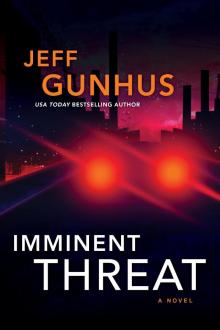 Imminent Threat
Imminent Threat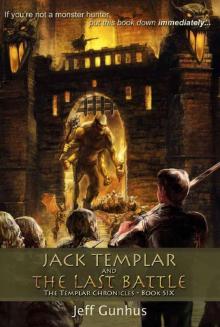 Jack Templar and the Last Battle
Jack Templar and the Last Battle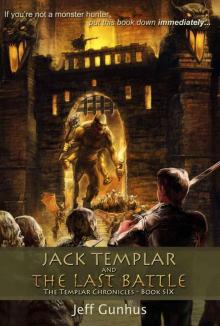 Jack Templar and the Last Battle (The Jack Templar Chronicles Book 6)
Jack Templar and the Last Battle (The Jack Templar Chronicles Book 6)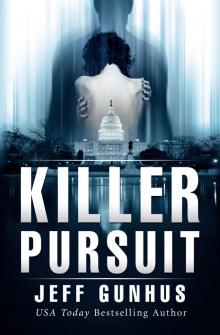 Killer Pursuit: An Allison McNeil Thriller
Killer Pursuit: An Allison McNeil Thriller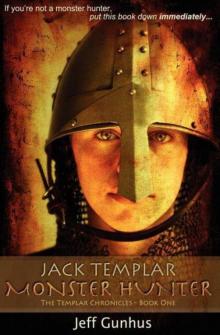 Jack Templar Monster Hunter
Jack Templar Monster Hunter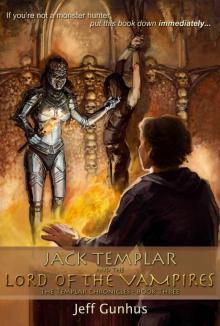 Jack Templar And The Lord Of The Vampires (The Templar Chronicles)
Jack Templar And The Lord Of The Vampires (The Templar Chronicles)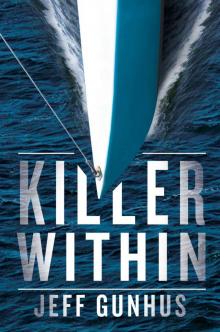 Killer Within
Killer Within The Torment of Rachel Ames
The Torment of Rachel Ames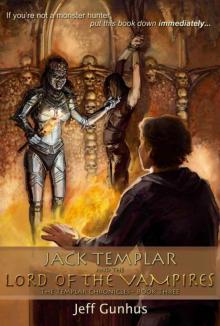 Jack Templar and the Lord of the Vampires
Jack Templar and the Lord of the Vampires Night Chill
Night Chill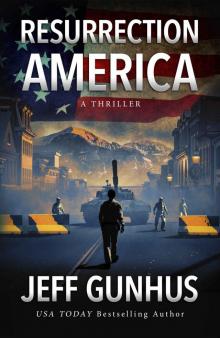 Resurrection America
Resurrection America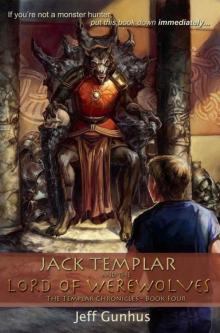 Jack Templar and the Lord of the Werewolves (Book #4 of the Templar Chronicles)
Jack Templar and the Lord of the Werewolves (Book #4 of the Templar Chronicles)